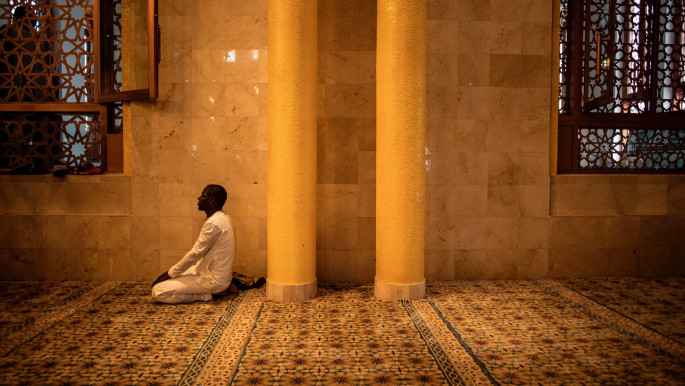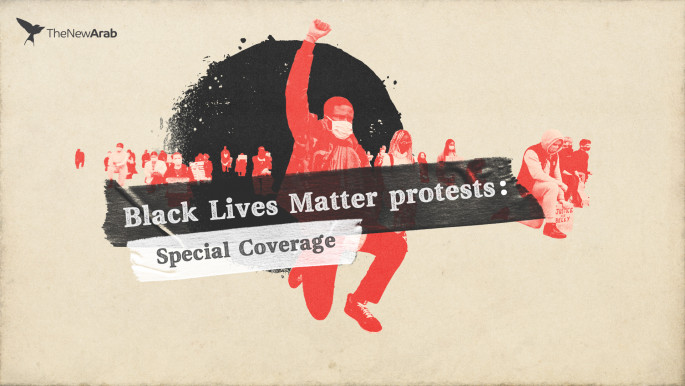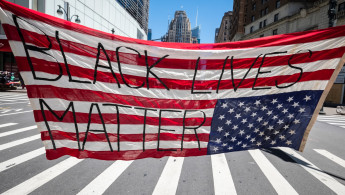The role of Black Muslims in America's fight for racial justice
On Friday, 28 August, on the 57th anniversary of the historic March on Washington, people will show what more than three months of continuous activism can achieve. The range of the protesters – from the transgender Black community in New York to mothers in Portland – shows the diversity of the movement.
Among them are Black Muslims, part of the backbone of America's civil rights movement, and a community whose dual identities have made them acutely aware of the urgency of demanding justice.
"There's heavy surveillance and over-policing in the Black and Muslim communities. I can't take off the colour of my skin, and I proudly wear a hijab," says Ismahan Abdullahi, Executive Director of San Diego's MAS PACE (Muslim American Society Public Affairs Community Engagement), who in the early 1990s moved as a child with her family to the US from Somalia, one of 13 countries on America's travel ban.
"We're in a moment of action, and we won't settle for breadcrumbs. We're beyond kneeling. This is a moment to get full systemic change, and not be shy or compromising when it comes to liberation. It's a resilient community, that knows what it needs."
 |
We're in a moment of action, and we won't settle for breadcrumbs. We're beyond kneeling |  |
She adds, "I think what folks don't realise is that there has been a lot of deep work Black Muslims have done. We're standing on the shoulders of the Black community. Because of the civil rights movement, a lot of people have been able to be here."
A history of activism
America's first Black Muslims were slaves who were kidnapped from predominantly Muslim parts of West Africa, some of whom left their mark on African American culture through music and literature. At the beginning of the 20th century, Muslim movements in the Black community were seen by many as going back to their ancestors' original faith.
 |
|
| An essential reading list on Black Muslim history |
It wasn't until the civil rights era of the 1960s that their voices became well known, as civil rights leader Malcolm X was a follower of the Nation of Islam, founded in 1930. He was assassinated by members of the group in 1965 after his break with Elijah Mohammed and turn towards orthodox Sunni Islam, as have most adherents.
The group's current leader, Louis Farrakhan, has a mixed record. On the one hand, his well-known bigoted remarks about Jews, the LGBTQ community and interracial marriage have led public figures to distance themselves from him. On the other hand, his work in community activism, such as prison rehabilitation and working with at-risk youths in low-income neighbourhoods, have earned praise from former Chicago Mayor Rahm Emmanuel.
Today, most Black Muslims in the US adhere to mainstream Sunni orthodox Islam, followed by those who identify as unaffiliated, with just two percent identifying with the Nation of Islam, according to a 2019 Pew Research survey. Black Muslims are broadly divided into those who were born into the faith, converts, and African immigrants.
According to the Pew survey, Black people make up 20 percent of America's Muslim population; however Muslims are only two percent of America's Black population, about half of whom are converts. Still, according to the Pew survey, like their Black Christian counterparts, they tend to have high levels of religious commitment. Many are involved in social justice causes, seeing their faith-based activism in a similar light to that of prominent Christians of the civil rights movement, such as Martin Luther King.
 |
Black Muslims are broadly divided into those who were born into the faith, converts, and African immigrants |  |
For Kenyatta Bakeer, a member and spokeswoman for Black Lives Matter, her faith-based activism goes back to the roles of her parents – Muslim converts in 1968 – in the civil rights movement and non-violence. "I heard all of the activism growing up," she told The New Arab.
"One step toward liberation is understanding the history we stand on. People can empathise, learn, and take lessons," says Abdullahi.
A bridge between communities
For Black Muslims, the discrimination they face is at least twofold. They are contending with Islamophobia and racism, at times within their own communities.
"There's still a gap between what Islam preaches and what happens at the leadership level," says Hussam Ayloush, executive director of the Council of American-Islamic Relations (CAIR) in California.
 |
|
| For the sake of George Floyd and black lives everywhere, make this moment count |
"We still see segregated mosques. It's cultural. If you build a mosque in an inner city, it will be majority Black. You see an unintended separation. It's not unusual to see predominantly Syrian or Nigerian mosques. The intention was never to isolate. But eventually it reinforces itself," says Ayloush, who regularly preaches to mosques of different communities, showing him both the diversity and divides in America's Muslim communities.
Activism has helped bridge America's Muslim community, the country's most diverse faith.
"No one can be fully immune to racism in America. Some people might have misperceptions about others. Some immigrants need to be educated about anti-Black racism. Sometimes I hear people say or repeat things they've heard, like 'All lives matter. Why should we only care about black victims of police brutality?' Black Muslims have been great in mobilising the community, and shake up prejudice and ignorance by sharing their stories," says Ayloush.
 |
No one racial minority can overcome or abolish the status quo by itself |  |
At the height of this recent wave of Black Lives Matter protests, a Palestinian-American family company in Minnesota, Holy Land Hummus, found itself in damage control after the CEO's daughter, then director of catering, saw some of her old racist, anti-Semitic and homophobic tweets (from 2012 and 2016) resurface.
CEO Majdi Wadi, called upon the advice of his friend, a local Black Muslim leader, Imam Makram El-Amin. Through El-Amin's guidance, Wadi instituted anti-racism training programs for his employees and also took steps to invest more in the local Black community, which had long been loyal customers.
It was a tough and costly lesson for this Palestinian Muslim family that had built their business largely from the patronage of Black customers, but also possibly an opportunity to build a more meaningful relationship with the local Black community.
 |
|
| Celebrating Juneteenth in the age of Black Lives Matter |
Indian-American comedian Hasan Minhaj has also seized the moment to address racial divisions in America's Muslim community. In one of his more serious segments at the beginning of the latest wave of demonstrations, he gave examples of bigotry or complicity of racism in immigrant communities, and urged everyone not to be silent about the killing of George Floyd at the hands of police officers.
Pointing to the Immigration Act of 1965, which was inspired by the Civil Rights Act of 1964, he also reminded Asian-Americans that some of the basic rights they enjoy are thanks to the civil rights work of African Americans.
Referring to his support for the Black Lives Matter movement, Ayloush, an Arab-American, says, "As a minority, much of the rights I enjoy came on backs of their sacrifices, for me it's a way to say thank you. It's the right thing to do now and as pay-back to the debt we owe."
 |
This is going to require the unity of everyone. What's critical to understand is people want the same thing |  |
Edward Mitchell, deputy director of CAIR in Washington, DC is hopeful about this recent engagement.
"Muslim Americans who aren't Black have really stepped up to take steps to address racism in communities, making sure mosques are diverse places, and making sure racism is called out in families. They're also making sure Muslims are not just advocating for Palestine overseas, but against police brutality at home."
He adds, "I'm heartened by the fact that so many people of so many backgrounds, in rural areas in conservative states, people have come together to demonstrate against anti-Black racism."
 |
|
| #BlackLivesMatter: The New Arab's special coverage of anti-racism protests |
Mitchell says, "It's easy in circumstances like this to be cynical, we want to try to stay hopeful. Things in this country have gotten better in the past and will get better in the future."
United for a better future
On the ground, the Black Lives Matter protests have seen unprecedented momentum. However, with important obstacles remaining, activists say that unity is key.
"When people live in a country of immigrants that prides itself on its cultural diversity and yet has widespread racial and other forms of prejudice, no one racial minority can overcome or abolish the status quo by itself," says Mohamed Camara, chair of the African studies department at Howard University, originally from Guinea.
"It will take constructive solidarity among all minoritized entities to form a progressive majority and help the racial majority free itself from the racist or racialist mentality that some of its members harbour. Only then will the entire nation be free from the shackles of prejudice and social injustice because injustice against anyone is a threat to justice for everyone."
Abdullahi says, "This is going to require the unity of everyone. What's critical to understand is people want the same thing."
Brooke Anderson is a freelance journalist covering international politics, business and culture
Follow her on Twitter: @Brookethenews


![President Pezeshkian has denounced Israel's attacks on Lebanon [Getty]](/sites/default/files/styles/image_684x385/public/2173482924.jpeg?h=a5f2f23a&itok=q3evVtko)



 Follow the Middle East's top stories in English at The New Arab on Google News
Follow the Middle East's top stories in English at The New Arab on Google News


